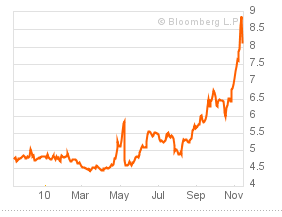November 15, Monday morning. Asian markets open. And no word regarding a bail-out for Ireland.
According to the FT (“Concern grows as Dublin spurns help”) Senior European officials held “informal” discussions late into the night to discuss whether Ireland needed an aid package. The meeting broke up without any action to be taken.
Apparently German officials tried to convince Ireland to “accept” financial help. Germany would rather shove more debt down starving countries’ throats (with the possibility of orderly debt restructuring) than see them exit the Euro. The latter would, apart from mayhem in financial markets, signify a serious setback for the unity of Europe.
The Irish government insists it does not need to raise any funds until spring 2011 and hence does not see the need for a humiliating bail-out now. Reading Irish newspapers and reader comments a clear message is showing through: for many, asking foreign countries and/or the IMF for help would be akin to giving up sovereignty. Finance minister Brian Lenihan hopes markets will came down once a new budget is passed on December 7. I doubt this is a good strategy.
The bond market has lost all trust in the Irish government. Last week, 10-year government bond yields exceeded 9%:
 10 year Irish Government bond yield. Source: Bloomberg.com
10 year Irish Government bond yield. Source: Bloomberg.com
If there is doubt about the solvency of the government, what does that mean for the solvency of banks whose solvency is guaranteed by that same state? Those guarantees become worthless.
The Irish banking system is being kept alive by financing from the ECB (European Central Bank). Over the last four weeks, the amount had crept up by EUR 9bn to EUR 130bn – not far off the entire Irish GDP (EUR 159bn). According to a report by Carnegie Endowment (http://carnegieendowment.org/publications/index.cfm?fa=view&id=40799) Irish banks expanded their balance sheets to a level close to 14 times GDP (how can the state credibly guarantee something of this size compared to the whole economy or tax base?). As those banks faced insolvency the government was forced to guarantee bank debt of EUR 440bn – 2.7 times national GDP. The cost of bailing out its banks will lead to a 2010 budget deficit of 32% of GDP – more than 10 times the maximum level agreed for Euro-zone members.
The numbers are so staggeringly high I doubt Ireland will get by without financial help. Depositors are already withdrawing money from banks. Over the third quarters, institutional customers of Bank of Ireland (the strongest of Ireland’s institutions) pulled out more than one third of deposits. It’s loan-to-deposit-ratio rose from 145% in June to 160% in November – a red flag.
Cash-flow-rich British Petroleum, after the oil spill in the Gulf of Mexico, was cut off by its bankers. According to former CEO Hayward “the capital markets were effectively closed to BP. We were not able to borrow either short or medium-term debt at all.” (interview in BBC’s Money Programme special on BP). How are Irish banks supposed to operate under these conditions?
Ireland might technically not be bankrupt, but de facto it is. When the big cat of insolvency rumors is being set loose, all the mice in grey suits skitter away. The cat won’t go away by itself. And that’s why no news is bad news for Ireland.
